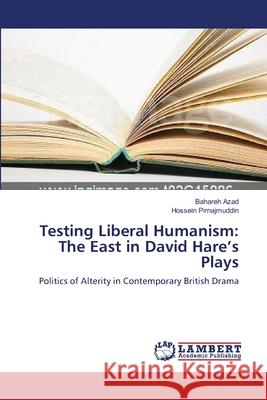Testing Liberal Humanism: The East in David Hare's Plays » książka
Testing Liberal Humanism: The East in David Hare's Plays
ISBN-13: 9783659475535 / Angielski / Miękka / 2013 / 140 str.
David Hare has been called the most political living contemporary British playwright. Arguably Hare has used the 'Third World' as a rough draft of liberal humanist theories - those mainly about politics. In comparison to other political dramatists of our time, he is a 'different' playwright in that his radicalism is not restricted to the British society and national themes: he also addresses the cataclysmic events of the contemporary East. As one of the leading playwrights of the post-war generation in Britain, he examines such overseas issues as the 9/11 event and its aftermath, the Anglo-American-led invasion of Iraq, the Israel/Palestine crisis, Vietnam War, as well as the Chinese Communist revolution. Many have considered this 'examination' profound. The main purpose of the writers in this book, however, is to try to 'examine' this claim. The writers try to look into Hare's motivation for addressing the 'Third World' theme, to shed light on the modality of his attempt to 'rewrite the East' from his Western point of view, and to locate this 'rewriting' in the context of discourses of Orientalism, and liberal humanism.
David Hare has been called the most political living contemporary British playwright. Arguably Hare has used the Third World as a rough draft of liberal humanist theories - those mainly about politics. In comparison to other political dramatists of our time, he is a different playwright in that his radicalism is not restricted to the British society and national themes: he also addresses the cataclysmic events of the contemporary East. As one of the leading playwrights of the post-war generation in Britain, he examines such overseas issues as the 9/11 event and its aftermath, the Anglo-American-led invasion of Iraq, the Israel/Palestine crisis, Vietnam War, as well as the Chinese Communist revolution. Many have considered this examination profound. The main purpose of the writers in this book, however, is to try to examine this claim. The writers try to look into Hares motivation for addressing the Third World theme, to shed light on the modality of his attempt to rewrite the East from his Western point of view, and to locate this rewriting in the context of discourses of Orientalism, and liberal humanism.











